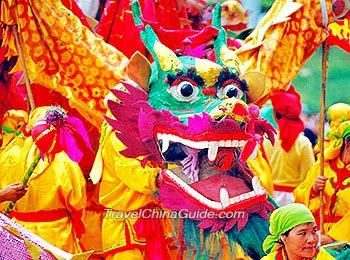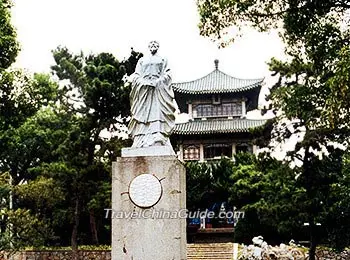Origin and History of Dragon Boat Festival
As a traditional festival originated from south China, the Dragon Boat Festival history in China is over 2,000 years long. People from different regions hold various ideas on the festival's origin and history, and the most popular saying is the legend associated with the great poet Qu Yuan in Warring States Period (475 - 221 BC). Hereunder is a chronology of Dragon Boat Festival origins related to celebrities in ancient China.
Totem Worshiping Activity (1.7 million years ago - the 21st century BC)
 |
| Chinese Totem - Dragon |
Why do we celebrate Dragon Boat Festival at the begining? Dragon, an imaginary creature, was always a totem for ancient China, and people in old Wuyue area (present Jiangsu and Zhejiang Provinces in southeast China) would worship the totem on the fifth day of the fifth lunar month in Prehistorical Times (1.7 million years ago - the 21st century BC). People made boats with dragon heads and tails, and held entertainment games. At that time, the image of dragon was closely associated with the fifth day of the fifth lunar month, on which today's Dragon Boat Festival falls. This is currently found the earliest Duanwu Festivla history.
An Evil Day before Warring States Period (Before 476 BC)
Before Warring States Period in ancient Chinese history, the fifth day of the fifth lunar month was widely regarded as an evil day, which may bring diseases and disasters. On that day, all the poisonous animals and insects would come out, such as snakes, scorpions and centipedes. It is believed that people born on the day would also cause misfortune to their parents. Hence, people hang calamus and mugwort leaves on door frames to dispel the evil spirits, and take herb water bath to prevent against skin disease.
Origin Story about State Advisor Wu Zixu (559 - 484 BC)
In some places of Jiangsu and Zhejiang Provinces, the Dragon Boat Festival history was dated to the time of Wu Zixu in Spring and Autumn Period (770 - 476 BC). Wu Zixu was a loyal statesman to his sovereign. His father and brother were killed by the King of Chu, so he sought refuge in Wu Kingdom and help the King crusade against Chu King. After defeating Chu, a new Wu emperor Fuchai came to the throne after his father's death, but he didn't value Wu Zixu's talents. He was convinced of other treacherous courtiers' slanders about Wu Zixu's guilt of treason, and eventually, Wu Zixu was forced to commit suicide with a sword. His body was thrown into river on the fifth day of May on lunar calendar. To engrave his loyalty and spirit, people fixed the day in honor of him.
Commemorating Patriotic Poet Qu Yuan (340 - 278 BC)
 |
| Statue of Qu Yuan |
Among all the Dragon Boat Festival origins, the legend story about Qu Yuan is the most popular one, which is widely regarded as the real origin.
Qu Yuan was an outstanding patriotic poet as well as politician in late Warring States Period. After witnessing the collapse of his country, Chu State, he was unwilling to give himself up to other countries.
Therefore, he committed suicide by drowning in Miluo River on the fifth day of the fifth lunar month. Hearing the woeful news, people sailed boats to salvage his body. To prevent his corpse from fishes' gnawing, people also threw Zongzi (sticky rice dumplings) to feed the creatures in the water. The realgar wine is also poured into the river to dispel the fishes away.
Legend of Filial Daughter Cao E (130 – 143 AD)
Cao E, a girl at age of 14 in Eastern Han Dynasty (202 BC - 220 AD), lived an austere life with his father in a fishing village. After a downpour on the fifth day of fifth lunar month, Cao E's father wanted to seize the chance to fish in Shunjiang River. Although it was dangerous with the deluge, the old man insisted to go. Cao E was worried about her father's safety, waiting at home anxiously. Till the sunset, her father still didn't return. Cao E headed to the river bund to search for her father for a long time, but she failed to discover anything. Neighbors persuaded her to give up, but she was not swayed, crying and shouting along the river.
Eventually, she spotted that her father was rolling in the wave, seeming to be alive. She jumped into the river and chased after her father. After a few days, local villagers founded Cao E, with her father on her back, both dead in the river. It was believed that Cao E's filial heart moved the God's will, so even she died, she could still find her father's body. People built a temple in memory of her filial piety, and the fifth day of the fifth lunar month was also used to mark her greatness.
Story of Woman Poet Qiu Jin (1875 - 1907)
This is one of the latest Dragon Boat Festival origins. Qiu Jin, a woman revolutionist and feminist in modern Chinese history. She was a poet, good at art, literature, music and horse riding. She sacrificed herself for her country, and died in the same day with Qu Yuan. Both of them are great poets, so Dragon Boat Festival is also called Poet's Day, which attaches their brave and honorable deeds to the celebration day.